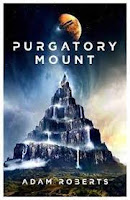On the spectrum of science fiction possibilities, I find myself most appreciative of writers who are trying to do something different than the mainstream. Naturally this can lead to odd conceptions, but I find such misadventures still more enjoyable than Joseph Campbell-ian action in space: push <here> to repeat. Robert Sheckley, Rudy Rucker, Bruce Sterling, Pat Cadigan, Kurt Vonnegut, Catherynne Valente, Jonathan Lethem, Micahel Swanwick—these and many others are writers who can be depended upon to regularly work outside norms in (mostly) successful fashion. Adam Roberts is another such writer, and his 2021 Purgatory Mount perfectly fits the bill. If there is anything predictable about Adam Roberts it is that he is unpredictable.
If Purgatory Mount were a journey, than it's cross-section would be shaped like a shallow bowl. Readers would start at one rim, learning about gods in a space ship who encounter a bizarre, Dauntian structure on an alien planet. Descending the slope of the bowl, readers would then uncover a primitive tribe of people seemingly on a generation starship. And finally, readers would hit the bowl's bottom and start an extended trek across it—the main body of the novel. About a group of teens in near-future USA, the five get into trouble when they copy (not steal!) a piece of protected IP from a tech company and hide it in their off-grid network. The police coming a knocking, what follows is a harrowing tale of when the system cracks and the rule of law falls apart.
Readers do eventually reach the other side of the bowl and begin ascending to the other rim. What seem disparate stories are in fact, linked. Said linkages form the novel's themes, which include time, relationships, and what we choose to do with those amid the caprices of existence. Roberts treads a fine line between maudlin and profound in highlighting these themes, but largely gets away with it given the strong degree of self-awareness. For as (semi) realistic the novel's body is, there is something of the tongue-in-cheek nature of Vonnegut or Sheckley's writings inherent to the final sections.
In the end, omnivorous, cosmopolitan readers stand to get the most out of Purgatory Mount (and Roberts' writing in general). There are references to Dante, Arthur C. Clarke, and Greek deism, as well as American politics and the potential for AI (circa 2020). Having read a good degree of Roberts, I can also say this is technically one of the best Roberts reads I've had in a long while. Where some of his writing can feel slapdash, homework-turned-in-at-the-last-moment type of material, Purgatory Mount reads smoothly, almost polished—like it went through more than one draft and was edited a few times. For readers who have never read Roberts, this is as good a place as any to jump in and experience the non-mainstream nature of his work. For experienced readers, this is yet one more, non-repeating idea from the mind of a writer clearly interested in looking beyond what the mainstream is doing.


No comments:
Post a Comment